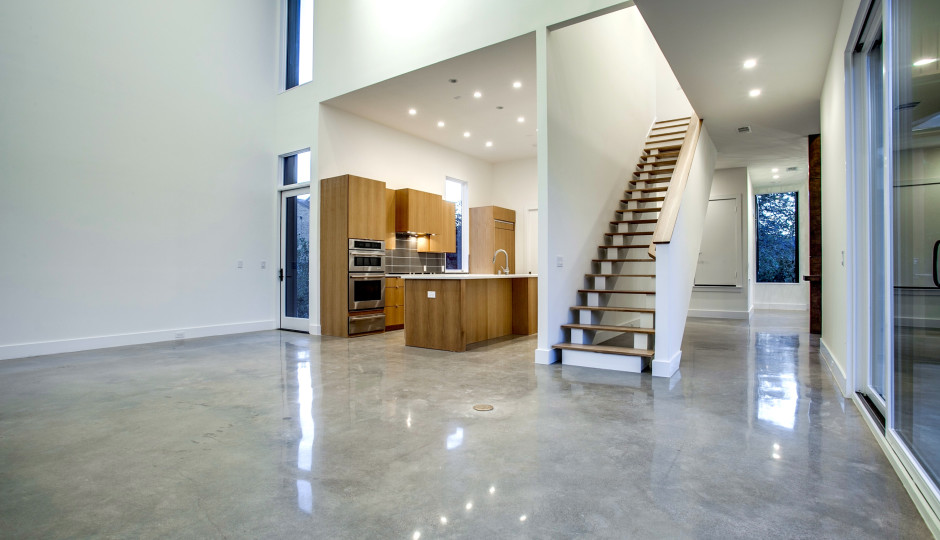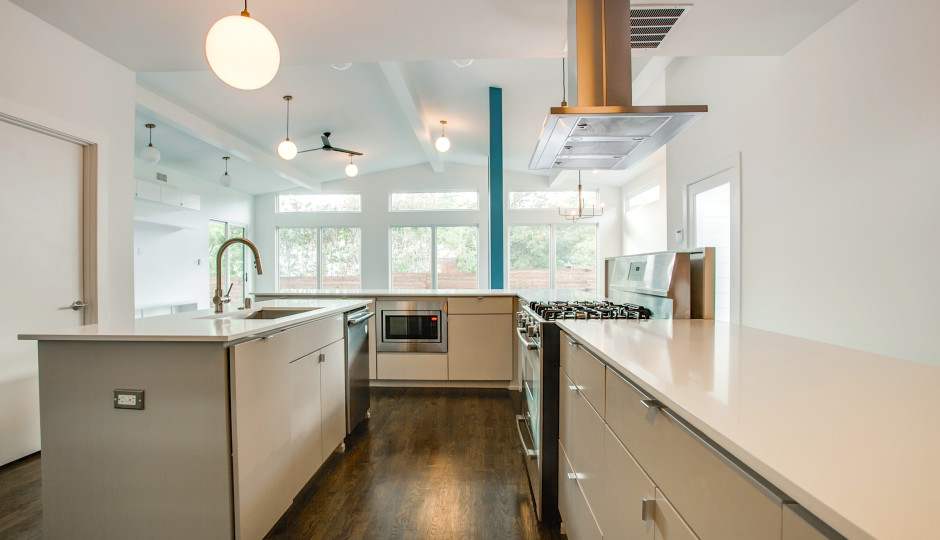Everyone wants to be hip, and the latest trends in design can help distinguish one home from another. And it’s not all flash; many new home fads are geared to pare maintenance and energy use and deliver information faster. Here’s a look at what’s coming.

Coral shades. A blast of a new color is often the easiest change for sellers to make, offering the biggest bang for their buck. Sherwin-Williams says Coral Reef (#6606) is 2015’s color of the year because it reflects the country’s optimism about the future. “We have a brighter outlook now that we’re out of the recession. But this isn’t a bravado color; it’s more youthful, yet still sophisticated,” says Jackie Jordan, the company’s director of color marketing. She suggests using it outside or on an accent wall. Pair it with crisp white, gray, or similar saturations of lilac, green, and violet.

Open spaces go mainstream. An open floor plan may feel like old hat, but it’s becoming a wish beyond the young hipster demographic, so you’ll increasingly see this layout in traditional condo buildings and single-family suburban homes in 2015. The reason? After the kitchen became the home’s hub, the next step was to remove all walls for greater togetherness. Design experts at Nurzia Construction Corp. recommend going a step further and adding windows to better meld indoors and outdoors.
Off-the-shelf plans. Buyers who don’t want to spend time or money for a custom house have another option. House plan companies offer myriad blueprints to modify for site, code, budget, and climate conditions, says James Roche, whose Houseplans.com firm has 40,000 choices. There are lots of companies to consider, but the best bets are ones that are updating layouts for today’s wish lists—open-plan living, multiple master suites, greater energy efficiency, and smaller footprints for downsizers (in fact, Roche says, their plans’ average now is 2,300 square feet, versus 3,500 a few years ago). Many builders will accept these outsiders’ plans, though they may charge to adapt them.
Freestanding tubs. Freestanding tubs may conjure images of Victorian-era opulence, but the newest iteration from companies like Kohler shows a cool sculptural hand. One caveat: Some may find it hard to climb in and out. These tubs complement other bathroom trends: open wall niches and single wash basins, since two people rarely use the room simultaneously.

Quartzite. While granite still appeals, quartzite is becoming the new hot contender, thanks to its reputation as a natural stone that’s virtually indestructible. It also more closely resembles the most luxe classic—marble—without the drawbacks of staining easily. Quartzite is moving ahead of last year’s favorite, quartz, which is also tough but is manmade.
Porcelain floors. If you’re going to go with imitation wood, porcelain will be your 2015 go-to. It’s less expensive and wears as well as or better than the real thing, says architect Stephen Alton. Porcelain can be found in traditional small tiles or long, linear planks. It’s also available in numerous colors and textures, including popular one-color combos with slight variations for a hint of differentiation. Good places to use this material are high-traffic rooms, hallways, and areas exposed to moisture.
Almost Jetson-ready. Prices have come down for technologies such as web-controlled security cameras and motion sensors for pets. Newer models are also easier to install and operate since many are powered by batteries, rather than requiring an electrician to rewire an entire house,says Bob Cooper at Zonoff, which offers a software platform that allows multiple smart devices to communicate with each other. “You no longer have to worry about different standards,” Cooper says.
Charging stations. With the size of electronic devices shrinking and the proliferation of Wi-Fi, demand for large desks and separate home office is waning. However, home owners still need a dedicated space for charging devices, and the most popular locations are a corner of a kitchen, entrance from the garage, and the mud room. In some two-story Lexington Homes plans, a niche is set aside on a landing everyone passes by daily.
Multiple master suites. Having two master bedroom suites, each with its own adjoining bathroom, makes a house work better for multiple generations. Such an arrangement allows grown children and aging parents to move in for long- or short-term stays, but the arrangement also welcomes out-of-town guests, according to Nurzia Construction. When both suites are located on the main level, you hit the jackpot.
Fireplaces and fire pits. The sight of a flame—real or faux—has universal appeal as a signal of warmth, romance, and togetherness. New versions on the market make this amenity more accessible with more compact design and fewer venting concerns. This year, be on the lookout for the latest iteration on this classic: chic, modern takes on the humble wood stove.
Wellness systems. Builders are now addressing environmental and health concerns with holistic solutions, such as heat recovery ventilation systems that filter air continuously and use little energy, says real estate developer Gregory Malin of Troon Pacific. Other new ways to improve healthfulness include lighting systems that utilize sunshine, swimming pools that eschew chlorine and salt by featuring a second adjacent pool with plants and gravel that cleanse water, and edible gardens starring ingredients such as curly blue kale.
Storage. The new buzzword is “specialized storage,” placed right where it’s needed. “Home owners want everything to have its place,” says designer Jennifer Adams. More home owners are increasingly willing to pare the dimensions of a second or third bedroom in order to gain a suitably sized walk-in closet in their master bedroom, Alton says. In a kitchen, it may mean a “super pantry”—a butler’s pantry on steroids with prep space, open storage, secondary appliances, and even a room for wrapping gifts. “It minimizes clutter in the main kitchen,” says architect Fred Wilson of Morgante-Wilson.

Grander garages. According to Troon Pacific, the new trends here include bringing the driveway’s material into the garage, temperature controls, sleek glass doors, specialized zones for home audiovisual controls, and a big sink or tub to wash pets. For home owners with deeper pockets, car lifts have gone residential so extra autos don’t have to be parked outside.
Keyless entry. Forget your key (again)? No big deal as builders start to switch to biometric fingerprint door locks with numerical algorithms entered in a database. Some systems permit home owners to track who entered and when, says Malin of Troon Pacific.
Water conservation. The concerns of drought-ravaged California are spreading nationwide. Home owners can now purchase rainwater harvesting tanks and cisterns, graywater systems, weather-controlled watering stations, permeable pavers, drought-tolerant plants, and no- or low-mow grasses.'
Salon-style walls. Instead of displaying a few distinct pieces on a wall, the “salon style” trend features works from floor to ceiling and wall-to-wall. Think Parisian salon at the turn of the century. HGTV designer Taniya Nayak suggests using a common denominator for cohesiveness, such as the same mat, frame color, or subject matter. Before she hangs works, she spaces them four to five inches apart, starting at the center and at eye level and working outward, then up and down. She uses Frog Tape to test the layout since it doesn’t take paint off walls. Artist Francine Turk also installs works this way, but prefers testing the design on the floor like a big jigsaw puzzle.
Cool copper. First came pewter; then brass made a comeback. The 2015 “it” metal is copper, which can exude industrial warmth in large swaths or judiciously in a few backsplash tiles, hanging fixture, or pots dangling from a rack. The appeal comes from the popularity of industrial chic, which Restoration Hardware’s iconic style has helped promote, says designer Tom Segal.
Return to human scale. During the McMansion craze, kitchens got so big they almost required skates to get around. This year we’ll see a return to a more human, comfortable scale, says Mark Cutler, chief designer of design platform nousDecor. In many living or family rooms that will mean just enough space for one conversation grouping, and in kitchens one set of appliances, fewer countertops, and smaller islands.
Luxury 2.0. Getting the right amount of sleep can improve alertness, mood, and productivity, according to the National Sleep Foundation. With trendsetters such as Arianna Huffington touting the importance of sleep, there’s no doubt this particular health concern will go mainstream this year. And there’s no space better to indulge the desire for quality rest than in a bedroom, says designer Jennifer Adams. “Everyone is realizing the importance of comfort, quality sleep, and taking care of yourself,” she says. To help, Adams suggests stocking up on luxury bedding, a new mattress, comfortable pillows, and calming scents.
Shades of white kitchens. Despite all the variations in colors and textures for kitchen counters, backsplashes, cabinets, and flooring, the all-white kitchen still gets the brass ring. “Seven out of 10 of our kitchens have some form of white painted cabinetry,” says builder Peter Radzwillas. What’s different now is that all-white does not mean the same white, since variations add depth and visual appeal. White can go from stark white to creamy and beyond to pale blue-gray, says Radzwillas. He also notes that when cabinets are white, home owners can choose bigger, bolder hardware.
Outdoor living. Interest in spending time outdoors keeps mushrooming, and 2015 will hold a few new options for enhancing the space, including outdoor showers adjacent to pools and hot tubs along with better-equipped roof decks for urban dwellers. Also expect to see improvements in perks for pets, such as private dog runs and wash stations, says landscape architect Jean Garbarini of Damon Farber Associates.
While it’s fun to be au courant with the latest trends, it’s also wise to put what’s newest in perspective for your clients. Remind them that the ultimate decision to update should hinge on their needs and budgets, not stargazers’ tempting predictions.
 Print
Print
